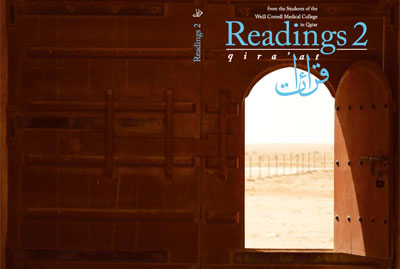Student Essays Show Importance of Communication in Medicine
March, 2011

This second edition of essays from WCMC-Q students showcases
commitment and compassion regarding health care issues and an
ability to critically analyze and speak authoritatively on them.
April will see the release of the second volume of a collection of essays by WCMC-Q medical students, entitled Qira’at: Readings from the Students of Weill Cornell Medical College in Qatar, 2001-2011. The publication is not only a chance for students to share their thoughts on literature, medicine, psychology and sociology, but is also a testament to the investment WCMC-Q makes into well-rounded, successful physicians.
“On a very practical level, numerous studies have shown that doctors who understand and who can effectively communicate with their patients have higher success rates in persuading patients to take their medicine, to return for follow-up care, and to establish longer health partnerships with their health care provider, all resulting in improved health outcomes,” wrote Alan Weber, assistant professor of English and Qira’at’s managing editor, in the book’s opening remarks.
As with the first edition of Qira’at, pre-medical and medical students were invited to submit essays to the book as part of the college’s Best Essays Contest. Tasnim Khalife won this year’s contest for her essay “A Scrutiny: The Role of the Face on Identity.” Under a different panel of judges from the Knight Institute, Khalife won the contest in 2008 as well.
“To have impressed two different sets of judges with her writing abilities obviously speaks to the uniqueness and clarity of Khalife’s voice,” said Weber.
After reading an article by Lucy Grealy—a woman whose face and childhood were distorted by disease and who dedicated her life to writing about it—Khalife said she wanted to explore the idea of how a face relates to one’s identity. “I realized that Grealy's plight revolved around her disfigurement, but ironically it was this same disfigurement that defined who she was,” she said.
Second-year pre-medical student Mutie Ullah Ahmed’s essay won second prize as an analysis of a pressing Gulf social issue entitled “Aliens in the Desert: Social Isolation of Migrant Populations in the Middle-East.” And Hiba Sheikh, a third-year medical student, won third prize for her essay “A Mother’s Munchausen Mischief.”
“We need to recognize our patients as people with life experiences, who may also have social and emotional problems that need to be addressed in a more holistic manner,” Khalife said. “I think that writing helps medical students early on to preserve the humanity in their job, and not just label a patient as ‘case x’ or ‘disease y.’”
In addition to being a means of humanizing the profession, Weber said that these essays represent important documents that contribute to the evolution of health care. Citing Dr. Muhamed Baljevic's (WCMC-Q class of 2010) article entitled “’Body Packing’ and its Implication in Qatar,” Weber said that some essays indicate a responsibility that students in the medical professions have to other members of the health care community. Dr. Baljevic’s article explores the mode of drug trafficking in the Gulf that involves ingestion of narcotics—a lethal activity on many levels.
“If you come across a new case and it has relevance to your colleagues, you really have a responsibility to write that up in to an article and publish it in a journal so that other medical professionals are alerted,” he said. “With this publication, we’re excited to show examples of how writing is actually used in the medical profession.”
Qira’at’s launch will take place on April 7th, at 7 p.m. in Lecture Hall 4 at WCMC-Q. The event is free and open to the public and will feature talks by contributing authors, an award ceremony and lite refreshments.
By Emily Alp
